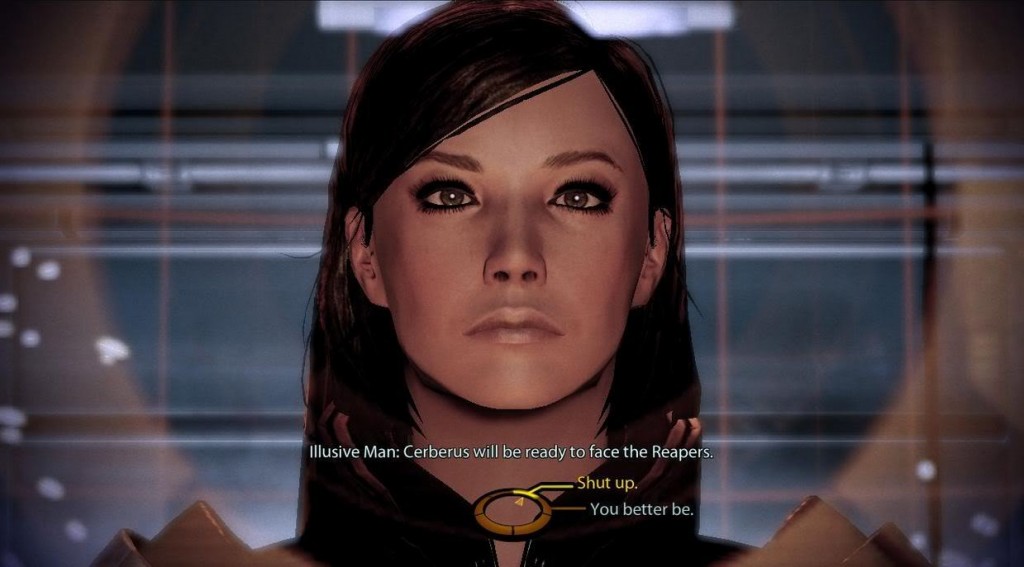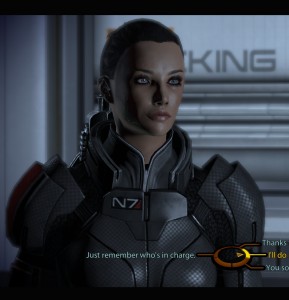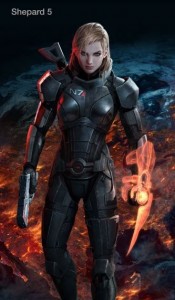I’m going to admit an embarrassing personality trait here, so be gentle…I always choose to play as females in games. There, now it’s out in the open.
Since I can remember, age 4 or so, I always liked girls better. Cheetara was my first Thundercats toy, and I wanted to learn how to play guitar so I could impress Jem (note: playing for the girl dressed as Jem at ComicCon didn’t work like I hoped it would). So it makes sense that, in games, I make bad-ass female characters. I find strong, heroic women more engaging and interesting than generic male counterparts. I like falling in love with these characters and creating someone that appeals to me. Women are more complex and interesting, with more empathy and gravitas appearing in their stories than the common meat-head protagonist.
With that in mind, it should come as no surprise that, since the original Mass Effect, I’ve been saving the galaxy as Wren Shepard on the Xbox 360 and Illyria Shepard on the PS3. The construction of the story line in Mass Effect is such that, as a female, you get an entirely different experience, not just from the male counterpart, but from the typical story you find in female-led games. Most trade on the sexuality of the character rather than the substance. While the potential lesbian tryst in the first Mass Effect caused an uproar, the game made you develop feelings for your love interest in such an honest and brutal way that the potential rebuff during Mass Effect 2 actually hurt. Outside of Metroid, there have been no female characters that are driven solely on their accomplishments, and even Samus was hidden from us until the end. FemShep was a new breed, and it is hard to find anyone that wasn’t profoundly affected away by her epic swings through the galaxy.
Early in the Mass Effect 3 PR cycle, it was revealed that FemShep would be the focus of more attention. There would finally be a default FemShep that would make appearances in commercials, promotional material and even the collector’s edition game box. This overjoyed all of the stalwart FemShep players. Despite the superior quality of Jennifer Hale’s performance, few people played with a female Shepard, and it seemed that Bioware was going to try and encourage more people to discover her story.
While the sentiment was well received, there were a great many rumblings from the FemShep community on the look of the new cover model. With no real face to her, every player had a different vision. They played as the “real” Commander Shepard, and any abridgment would be hard to stomach. To their credit, Bioware tried to involve all of us by having a Mass Effect Beauty Contest, starting in July and ending a few days ago. Of the half-dozen choices, representing a wide array of looks, our winner is Shepard 5, a blond-haired, blue-eyed fashion model whose look is brand-new and has not been an option in any of the previous games. Instead of only representing a few players that had chosen a similar look, a character model that was not even possible to create in the first two games will represent FemShep from now on. This generic sorority girl is now the face of a beaten-down, resurrected military commander who has committed genocide (or prevented it), parlayed with Reapers and led squads victoriously into the face of certain extinction. Sadly, the new model looks more likely to lead a shopping excursion. Once again, the female lead has been reduced to her looks instead of representing the character painstakingly developed over two games.
The early tallies saw an explosion of controversy from players, journalists and bloggers. PCGamer editor Kim Richards posted her take in July on the apparent outcome of the vote. “Death to the Blonde Shepard” implored readers to vote for the model that would represent who Shepard is instead of voting on her level of attraction. Sadly, Kim’s attempt to make herself a sexual object at the beginning of her article by hinting at her Catholic School girl liaisons invalidates a large portion of her argument, and strikes a blow to legitimate female editors in the gaming community who are trying to be recognized for their ability, not their tits. However, her attempt to shift the vote to a character model that was more in line with the Shepard we’ve seen over the years invigorated fans as well as writers, many of whom joined in on the attempt to save FemShep. In the end, Shepard 5 won by almost 20,000 votes, gathering more than twice the number of the runner-up.
The way the vote turned out has been placed squarely on the shoulders of male gamers, the 80% that play the game and choose the male Shepard. Perhaps some of them will now try out FemShep, but why would they not just import the male character they have been playing? Why would someone jump into the third iteration with a character we have never seen before? If they decided to go back to the first two games, they can’t play the FemShep from Mass Effect 3, she doesn’t exist. It seems like our beloved Commander is being tossed into the scrap heap for this pretty young upstart, letting us know that the hard work and love we put into our FemShep characters wasn’t worthwhile to the general audience. Apparently the public needed a pretty face to motivate them to play as a female. The story isn’t important or relevant if there isn’t a hot blonde tacked onto the cover. This vote helps to solidify the idea that games are male dominated and sold through sex and violence. Whether that is a fair assessment, and I like to hope it isn’t, doesn’t really matter. Just like the contest for FemShep, it’s appearance that matters, and gamers just gave themselves another black eye.






